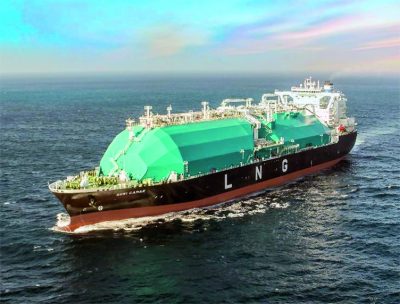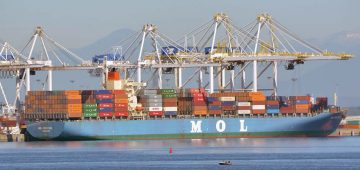Algoma Corporation’s 19,851gt/2017 built Algoma Innovator, the first of two new self-unloading dry-bulk freighters commenced her delivery voyage from the 3 Maj Shipyard in Croatia to Canada on 23rd February, laden with a cargo of bauxite. The 25,100dwt ship is 198m long with a 23m beam and is intended for service on the Great Lakes and the St. Lawrence River.
Golar LNG has decided to reactivate its 96,011gt/1977 built LNG carrier Gandria from layup and she has been moved to Singapore’s Keppel Shipyard. In response to increased demand, the company also reactivated the 93,750gt/2005 built LNG carrier Golar Viking, which entered the spot market during February 2018. A 15-year charter for an LNG carrier in the Atlantic Basin with an undisclosed energy company will also see either the 106,577gt/1981 built Golar Spirit or the 95,879gt/1977 built Golar Freeze deployed.
Goodbulk took delivery of the 154,139gt/2010 built Aquitaine (181,725dwt) on 20th February as the fifth delivery of the seven initial Capesize vessels acquired from funds managed by CarVal Investors, LLC. The following day the company took delivery of the 88,930gt/2006 built Aquascope (174,008dwt) as the fifth of the six vessels.
Ilshin Logistics of South Korea has taken delivery of the 31,005gt/2018 built Ilshin Green Iris, the world’s first LNG-fuelled bulk carrier, from Hyundai Mipo Dockyard. With a dual class of Lloyd’s Register and Korean Register, the 50,000dwt bulk carrier has also been verified to be in compliance with the International Gas Fuel (IGF) Code. The ship is the result of a partnership project, announced in July 2016, to develop the first in a new generation of environmentally-friendly LNG-fuelled bulkers. The ship has a Type ‘C’ LNG fuel tank with a capacity of 500m3, fabricated from austenitic high manganese steel and located on the aft mooring deck. The material has a high manganese content and is specially designed for cryogenic LNG and liquefied gas storage applications. The properties and characteristics of the high-manganese steel, as well as the required welding technology and fuel tank design, have been proven suitable for cryogenics.


MISC took delivery of the Seri Camar (above), the fourth in its series of five MOSS-Type Seri C Class Liquefied Natural Gas (LNG) carriers built by Hyundai Heavy Industries (HHI) during the week commencing 26th February. The newbuild LNG carrier is part of the series of five newbuildings which MISC took over the contract for from parent Petronas in 2015. The newbuild will be chartered to Petronas for the next 15 years, MISC said in a stock market announcement. The Malaysian-flagged vessel will be owned and operated through MISC’s tanker unit MISC Tankers under Labuan-incorporated company Seri Camar. The 133,612gt/2018 built Seri Camar joins her sister MOSS-Type newbuilds Seri Cenderawasih, Seri Camellia and Seri Cempaka on long-term charter to Petronas. The 150,200 cbm LNG carrier was delivered at a naming ceremony held at the HHI yard in Ulsan, South Korea. Along with the unique integrated hull design, the MOSS-Type vessels have been designed to minimise hull resistance, increase propulsion efficiency, reduce power requirements, and reduce carbon dioxide emissions. Energy saving devices include pre-swirl duct and propeller boss cap fins, providing around 4% energy savings at design draught, along with an X-twister rudder for improved manoeuvring performance. The delivery of Seri Camar brings the current number of MISC’s LNG fleet to 28 vessels, further strengthening MISC’s position as a reliable and safe transporter of LNG.
TMS Cardiff Gas Ltd. has signed a new maintenance agreement with Wärtsilä to ensure the maintenance predictability of the operation of four TFDE LNG Carriers in TMS Cardiff Gas’ fleet. Eniram’s data collection platform and advanced data analytics helps TMS Cardiff Gas to achieve optimal fleet operations, resulting in reduced fuel costs and emissions. The maintenance agreement, signed in December 2017, advances the performance monitoring of TMS Cardiff Gas’ vessels and is an expansion of the earlier Technical Management Agreement signed in 2014. TMS Cardiff Gas, established in 2011, is an operator and manager, with a fleet of ten modern Gas Carriers (six LNG Carriers and four VLGCs) and is part of the TMS group that manages more than 120 ships across the LNG, LPG, Oil/Chemicals, Dry Bulk and Offshore sectors.
Tsuneishi Shipbuilding Co., Ltd. completed the construction of its first 38,300t TESS38 bulk carrier Weco Josefine for Grand Blue Shipping of Japan in January at Cebu in the Philippines. The TESS38 class of vessel is a new handysize carrier in the TESS series, of which over 400 vessels have been delivered. Three metres longer than its predecessor, the TESS35 is 180m long allowing a 3,000 tonne increase in deadweight capacity for more efficiency. The ship is designed to carry a wide range of cargo, including logs, grains, coal and iron ore.
Waterfront Shipping, a methanol shipping specialist, announced plans to build four new oceangoing tankers during February, capable of running on clean-burning methanol fuel. The 49,000 dwt methanol tankers have been ordered through a joint-industry project involving Waterfront Shipping, Marinvest, IINO Kaisha, Mitsui & Co. and NYK Group. The newbuilds will join an existing fleet of seven 50,000dwt methanol-fuelled methanol tankers that have been chartered by Waterfront since their delivery at the beginning of 2016. The four new vessels will be delivered in 2019 and, similar to their predecessors will be built with MAN B&W ME-LGI 2-stroke dual-fuel engines that can run on methanol, fuel oil, marine diesel oil or gas oil. They will be built in Korea at Hyundai Mipo Dockyard, where several of the first-generation vessels were built.

Rotterdam Port recorded a particularly strong growth in container throughput of 12.3% (in tonnes, or13.7 million TEU) in 2017 whilst total cargo throughput rose by 1.3%, with the port returning to the growth trend seen prior to 2016. Total tonnage increased from 461 million to 467 million. The increase in containers was offset by a fall in dry bulk of 2.6% and in wet bulk of 4.1%. Break bulk (Roll on/Roll off and other break bulk) increased by 7%. The Port of Rotterdam Authority booked a turnover of €712.1 million in 2017, an increase of 4.6% by comparison with 2016 whilst operating expenses increased by 9.3% to €261 million.




Comments
Sorry, comments are closed for this item